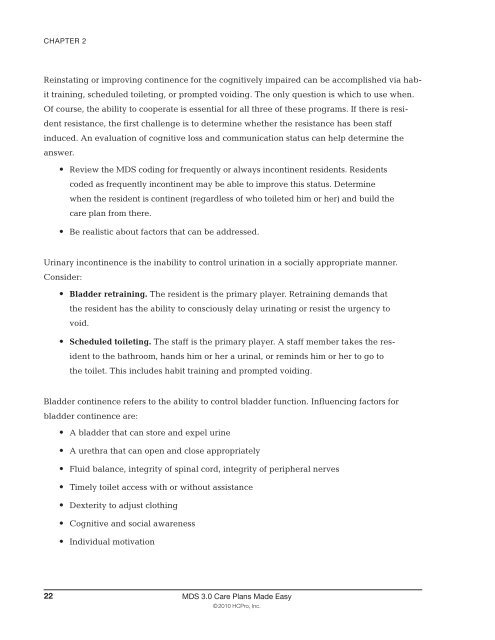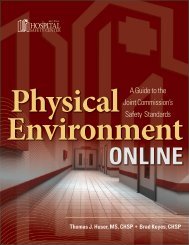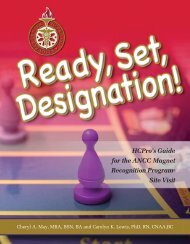Debbie Ohl, RN, M.Msc., PhD - HCMarketplace.com
Debbie Ohl, RN, M.Msc., PhD - HCMarketplace.com
Debbie Ohl, RN, M.Msc., PhD - HCMarketplace.com
You also want an ePaper? Increase the reach of your titles
YUMPU automatically turns print PDFs into web optimized ePapers that Google loves.
CHAPTER 2<br />
Reinstating or improving continence for the cognitively impaired can be ac<strong>com</strong>plished via habit<br />
training, scheduled toileting, or prompted voiding. The only question is which to use when.<br />
Of course, the ability to cooperate is essential for all three of these programs. If there is resident<br />
resistance, the first challenge is to determine whether the resistance has been staff<br />
induced. An evaluation of cognitive loss and <strong>com</strong>munication status can help determine the<br />
answer.<br />
•• Review the MDS coding for frequently or always incontinent residents. Residents<br />
coded as frequently incontinent may be able to improve this status. Determine<br />
when the resident is continent (regardless of who toileted him or her) and build the<br />
care plan from there.<br />
•• Be realistic about factors that can be addressed.<br />
Urinary incontinence is the inability to control urination in a socially appropriate manner.<br />
Consider:<br />
•• Bladder•retraining. The resident is the primary player. Retraining demands that<br />
the resident has the ability to consciously delay urinating or resist the urgency to<br />
void.<br />
•• Scheduled•toileting. The staff is the primary player. A staff member takes the resident<br />
to the bathroom, hands him or her a urinal, or reminds him or her to go to<br />
the toilet. This includes habit training and prompted voiding.<br />
Bladder continence refers to the ability to control bladder function. Influencing factors for<br />
bladder continence are:<br />
•• A bladder that can store and expel urine<br />
•• A urethra that can open and close appropriately<br />
•• Fluid balance, integrity of spinal cord, integrity of peripheral nerves<br />
•• Timely toilet access with or without assistance<br />
•• Dexterity to adjust clothing<br />
•• Cognitive and social awareness<br />
•• Individual motivation<br />
22 MDS 3.0 Care Plans Made Easy<br />
© 2010 HCPro, Inc.





